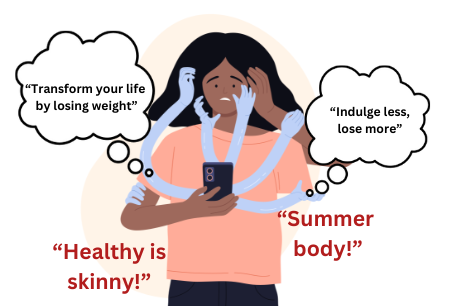As soon as the clock strikes midnight every Jan. 1, millions begin their “new year, new me” outlook. New Year’s resolutions are traditionally a time when people can reflect on the past year and set goals for the upcoming year, usually targeting self-improvement. However, this idea of self-improvement has been twisted over time, convincing people that they need to change themselves excessively.
The concept of self-improvement has become centered around physical appearance and validation. It’s no secret that the media profits off of people’s weight insecurities, particularly around the new year. This common desire for self-improvement has turned into a promotion for weight loss. By capitalizing on these insecurities, the media encourages people to spend their hard-earned money on products and services that claim to help them achieve their goals, even if they are ineffective or unsustainable. The media has a lot of manipulative methods for making consumers think they need to lose weight and reinforce unhealthy societal standards.
The media is often an unreliable source for health tips. Many advertisements out there employ sneaky marketing techniques that do not follow an inclusive approach. A lot of media influence lacks the understanding that no two bodies are the same; something that might work for one person won’t work for everyone.
So, what can we do in response?
It’s important to rethink our resolutions so they fit a healthier approach to self-improvement. Health is much more than just a number on a scale; there are so many other factors that are important to a person’s quality of life. By focusing solely on weight loss, people may overlook other vital aspects of their health.
There is nothing wrong with wanting personal development in the new year, you just have to ask yourself if you’re doing it because you want to, not because you have to.









